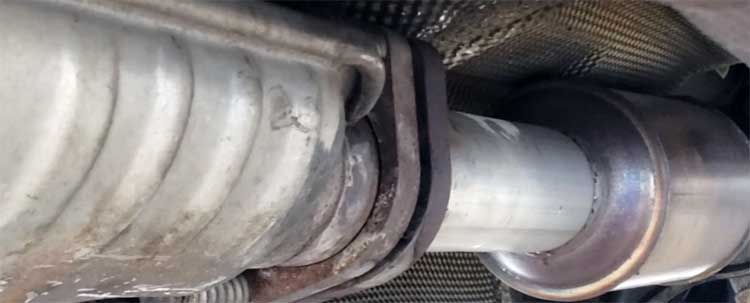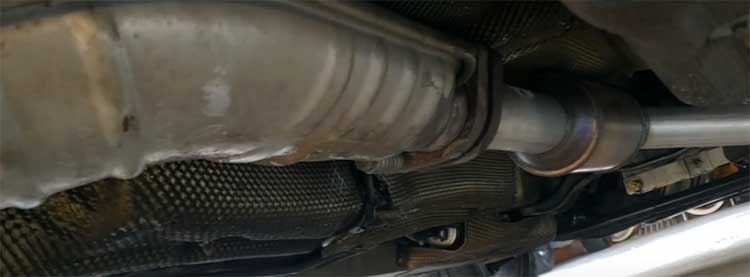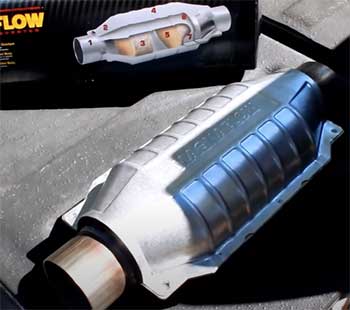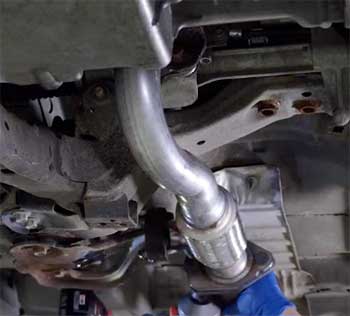When it comes to replacing your catalytic converter, it’s tempting to pick a product that’s readily available and seemingly affordable. I mean, who doesn’t want a convenient solution when dealing with auto parts?
However, if you’re considering the Davico catalytic converter, it might be worth pausing for a moment. While it’s often marketed as a straightforward solution for emissions problems, there’s more to this product than meets the eye.
Let me take you through my analysis of Davico catalytic converters, including the pros and cons, comparison with other brands, and some maintenance tips to help you make an informed decision.
My Experience With Davico Catalytic Converters

I want to share my own experience with Davico catalytic converters so you can get a real sense of what to expect. Initially, I was drawn to Davico because of its affordability and the promise of an exact fit.
After all, saving money while getting a part that matches original equipment sounds ideal, right? Unfortunately, my experience wasn’t as smooth as I had hoped.
After ordering a Davico catalytic converter, I was optimistic about getting it installed quickly. However, the installation process quickly turned sour when the mechanic found defects—specifically, small holes that caused exhaust leaks.
I had to take the car back to the shop, and the converter had to be welded to fix these issues. This meant additional labor costs, extra time without my vehicle, and a lot of inconvenience.
It was frustrating to deal with a part that should have been ready to use out of the box. I also spoke to others who had similar experiences, where the converter either didn’t fit correctly or had defects that required immediate attention.
For me, the added expenses in labor and the time lost outweighed the initial savings I thought I was getting by choosing Davico.
In hindsight, I would have preferred spending a bit more on a brand with a better reputation for quality.
The stress of dealing with repairs and the uncertainty of whether the part would hold up made the whole experience less than ideal. If you’re considering Davico, just be aware that the lower price might come with more hassle than it’s worth.
Pros of Davico Catalytic Converters

- Exact-Fit Design: On paper, the Davico catalytic converter is made using sample parts of the original equipment. This means it’s supposed to provide an exact fit, which is always a great advantage. When you don’t have to spend additional time modifying parts just to get them installed, it saves time and stress.
- Made in the USA: There’s something reassuring about knowing the parts you’re buying are made in the United States. A lot of consumers believe that local production is synonymous with higher quality. This is certainly a selling point, especially considering that many aftermarket catalytic converters are made overseas and may not adhere to the same standards.
- Included Gaskets: Davico catalytic converters come with gaskets, which is a bonus. It may not seem like a big deal, but finding the right gasket can sometimes be a pain. Having it included saves time and money.
- Compatibility with Many Vehicles: One of the biggest advantages of Davico’s converters is their compatibility. They’re often recommended for various models and generally work well with vehicles over 80,000 miles.
Cons of Davico Catalytic Converters
Now, let’s get to the side of the story that makes me think twice about recommending Davico—the cons. Unfortunately, there are some notable downsides.
- Defective Units Are Too Common: One of the major problems with Davico converters is the seemingly common issue of defective units. From my research, and quite a few customer reviews, it appears that a number of units arrive with defects, such as holes in the converter itself. And once you’ve already installed it and find these issues, you’re in for extra labor costs to fix what shouldn’t have been a problem in the first place.
- Poor Build Quality: Let’s be real—when you’re spending significant money on an auto part, you expect it to work properly. Yet, time and again, I’ve read and heard complaints about the build quality. Holes, leaks, and problems that require welding to fix simply shouldn’t be the reality of a “quality” catalytic converter.
- Not Legal in All States: Another drawback is the legality. If you’re in New York or California, Davico converters are essentially off-limits due to stringent emissions standards. For people living in those states, this is a dealbreaker, and it limits options for environmentally-conscious drivers.
- Frequent Welding Needed: A couple of users mentioned that they ended up welding parts of the converter because of leakage. That’s not only inconvenient but also adds up in terms of costs, especially if you have to pay a mechanic for these services. In my experience, a replacement part should be just that—a replacement, not a fixer-upper.
Maintenance Tips For Catalytic Converters
Maintaining your catalytic converter is essential, not just for your car’s health but also for the environment. I’ve found a few useful tips that can extend the life of your catalytic converter, regardless of whether it’s a Davico or another brand.
- Use Proper Fuel and Avoid Contaminants: One of the best ways to maintain a healthy catalytic converter is to use quality fuel. Bad gasoline or additives that aren’t suited for your car can shorten the lifespan of a catalytic converter significantly.
- Get Regular Engine Tune-Ups: A well-maintained engine means a well-functioning catalytic converter. Ensure that your spark plugs, air filters, and fuel injectors are functioning properly. Misfires or poor combustion can overwhelm the converter, leading to blockages or overheating.
- Keep an Eye on Your Oxygen Sensor: A malfunctioning oxygen sensor can have a cascading effect on your catalytic converter. It could lead to the engine running too rich or too lean, causing extra stress on the converter.
- Decarbonize Your Vehicle: Using products like the Davico part number 1540EA Sledgehammer Induction Cleaning Kit from Run-Rite prior to replacement helps decarbonize your engine, reducing stress on the catalytic converter. This step is particularly helpful for vehicles that have accumulated over 80,000 miles.
Comparing Davico With Other Brands
When evaluating Davico catalytic converters, it’s important to compare them to other popular brands on the market, such as Evan Fischer, MagnaFlow, and Walker. Each of these brands has its strengths and weaknesses, so let’s see how Davico holds up against them.
- Davico Vs. Evan Fischer Catalytic Converters

Evan Fischer is another brand that aims to offer budget-friendly solutions, similar to Davico. However, Evan Fischer catalytic converters are often praised for better consistency in quality compared to Davico.
The installation process for Evan Fischer units tends to be smoother, as fewer defects and issues are reported by customers. While both brands are more affordable than premium options, Evan Fischer seems to provide a more reliable experience in terms of build quality, which means you’re less likely to run into extra labor costs for fixing defects.
However, one downside of Evan Fischer converters is that they may not have the same vehicle coverage as Davico, especially for less common models. Still, if your vehicle is compatible, Evan Fischer might be a better choice for avoiding the headaches associated with defective units.
- Davico Vs. MagnaFlow Catalytic Converters

MagnaFlow is known for its premium quality and performance-oriented products.
Compared to Davico, MagnaFlow converters come at a higher price point, but the added cost often translates to better reliability and a longer lifespan.
The build quality of MagnaFlow is noticeably superior, with fewer instances of defects or leaks.
MagnaFlow converters are also known for their compliance with emissions standards in all states, including California and New York, which makes them a more versatile option.
If you’re looking for a catalytic converter that’s built to last and you don’t mind spending a bit more, MagnaFlow is a solid choice.
On the other hand, Davico may appeal to those on a tighter budget, but the potential costs of labor and repairs could offset the initial savings.
- Davico Vs. Walker Catalytic Converters

Walker catalytic converters are another alternative that consistently ranks well among consumers. Compared to Davico, Walker converters are known for their reliable fit and durability.
One of the major advantages of Walker is the attention to detail in manufacturing, which means fewer instances of defects and a higher rate of successful installations.
Walker converters also come with a good warranty, adding an extra layer of security for buyers.
While Davico might be cheaper upfront, Walker converters tend to have a better long-term value due to their solid construction and lower likelihood of defects.
Walker is also more widely accepted across various states in terms of emissions compliance, making it a more versatile option for consumers who need a reliable product that meets strict regulations.
Also Read: Is Dura Lube Catalytic Converter Cleaner Worth It?
Frequently Asked Questions (FAQ)
The lifespan of Davico catalytic converters can vary significantly. While they are designed to last for years, their durability has come into question due to reports of defective units and quality issues. Ideally, if well-maintained, they should last between 5 to 10 years, but frequent defects can shorten their lifespan considerably.
Davico catalytic converters are made in the USA. The company takes pride in local production, which is often seen as a positive factor by consumers looking for higher quality and reliability.
Chinese catalytic converters tend to vary widely in quality. While some are made well and perform adequately, others may not meet the same emission standards or durability requirements. It’s important to check reviews and buy from reputable sources to ensure you’re getting a reliable part.
The highest paying catalytic converters are generally from luxury cars, such as certain models of Mercedes, BMW, and other high-end brands. These converters contain higher amounts of precious metals like platinum, palladium, and rhodium, making them more valuable when recycled.
Final Thoughts
Ultimately, buying a catalytic converter is an investment in your vehicle’s longevity and emissions compliance. When it comes to Davico, while there are some positive aspects—like the fact that they’re made in the USA and designed to fit perfectly—the drawbacks are hard to ignore.
The potential for defects, additional labor costs, and the hassle of dealing with welding issues just makes it tough to recommend.
If you’re on a tight budget and prepared for potential issues, Davico might work for you. But for anyone looking for a smooth, reliable experience, it’s worth looking into other brands like Walker or MagnaFlow.

